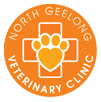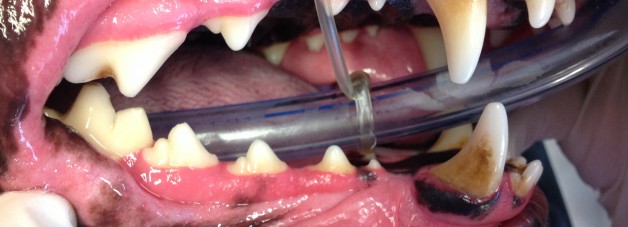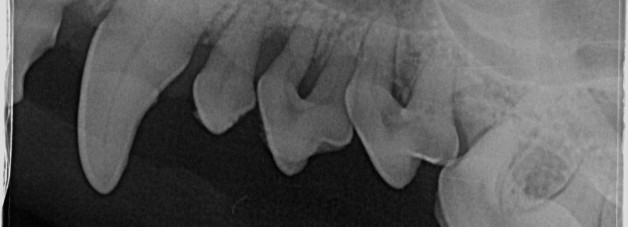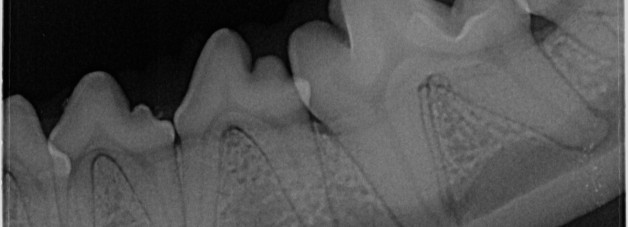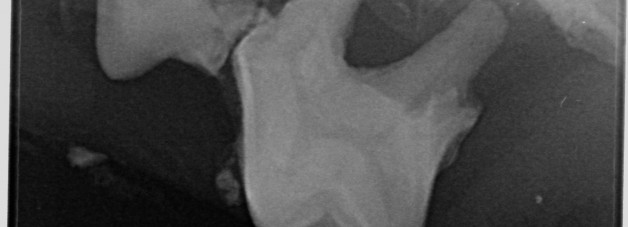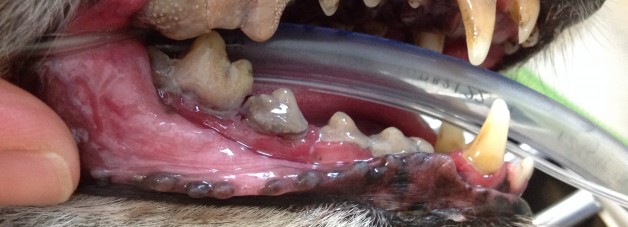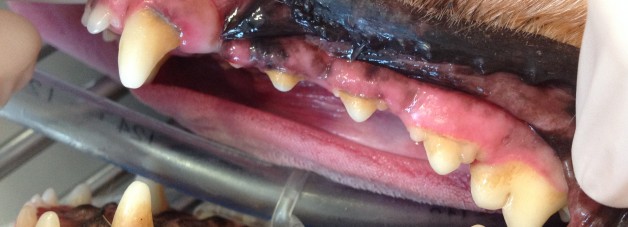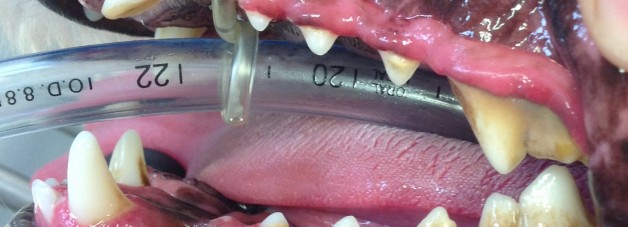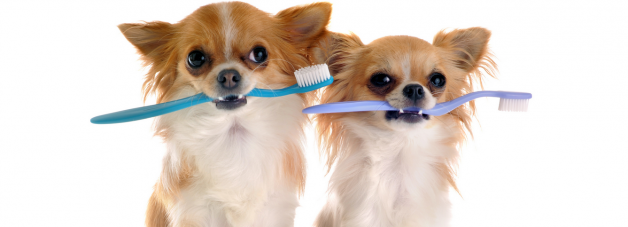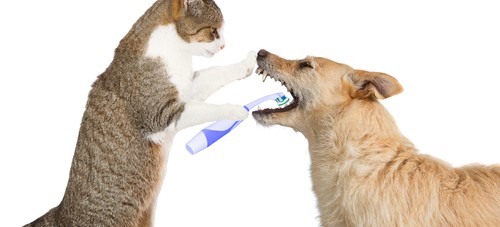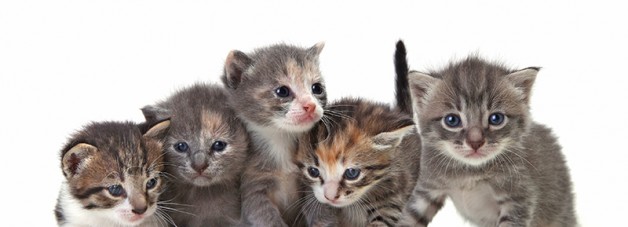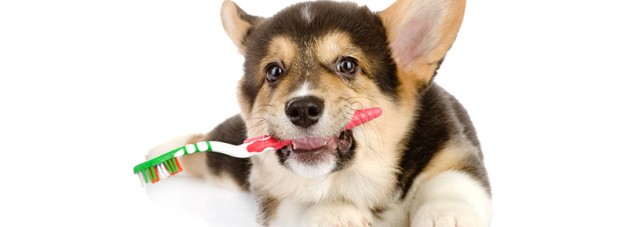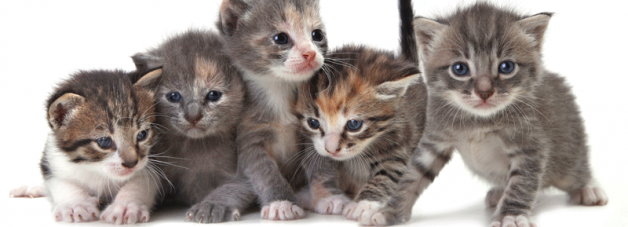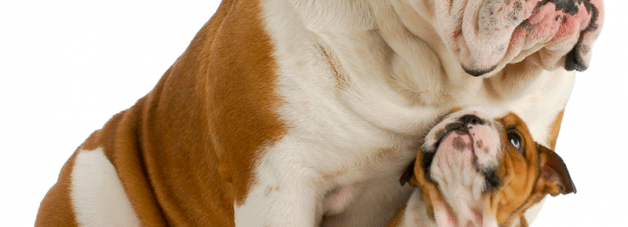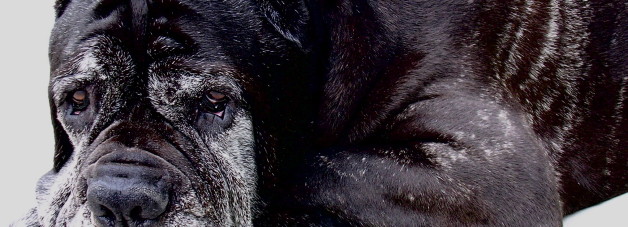Book your pet in for a FREE dental check during August and get 10% OFF all dental procedures.
During a dental check the vet will examine your pet’s mouth to assess for:
- the degree of tartar present (tartar is hardened bacterial sludge)
- the degree of gingivitis (gum infection and inflammation)
- loose or fractured teeth
- teeth with holes or resorptive lesions
- any other mouth problems such as ulcers from misaligned teeth or mouth tumors
Periodontal disease is typically graded from 1 to 4 as follows:
GRADE 1
Grade 1 teeth are starting to accumulate tartar but this has not yet caused gingivitis or bone infection. This is actually the BEST TIME to have your pet’s teeth cleaned as it prevents progression of infection and stops irreversible damage to the gums and bone surrounding the teeth.
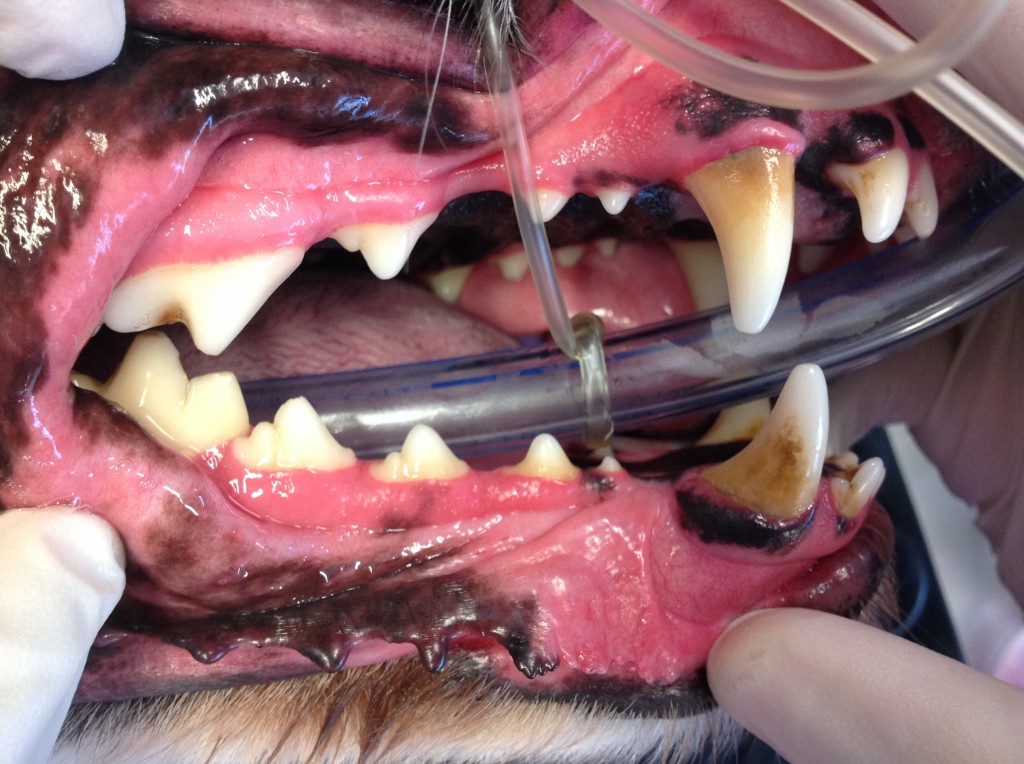
Treatment simply involves scaling the tartar off and polishing the teeth. This is similar to what people have done in the dentist’s chair but is performed under general anaesthetic for your pet.
GRADE 2
Tartar is more extensive, reaching the gum line and causing gingivitis and bone infection.
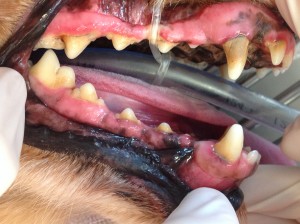
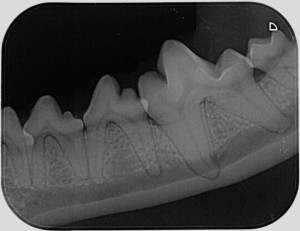
Treatment includes full mouth dental x-rays to assess the extent of bone loss around teeth and determine whether a particular tooth is beyond saving. Tartar is then scaled off the teeth and from under the gum line and the teeth are polished.
GRADE 3
Extensive bacterial infection has led to significant bone loss around some teeth such that the roots of these teeth have become exposed. Teeth roots are not covered in the shiny, slippery enamel that teeth crowns are. Even if they are cleaned they readily accumulate tartar again and the cycle of infection, destruction and pain continues. Teeth with exposed roots are therefore best removed.
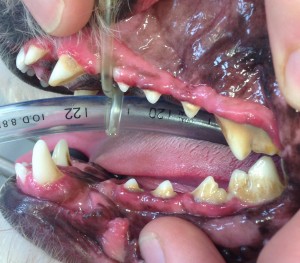
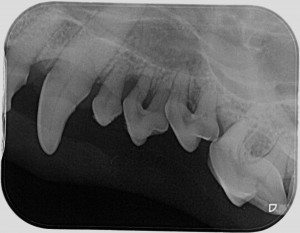
Treatment again involves full mouth dental x-rays to determine which teeth need to be extracted. Local anaesthetic nerve blocks are performed prior to any extractions so that your pet is completely comfortable when they wake up from general anaesthetic. Premolars and molars often need to be cut into their separate roots before they can be successfully removed. After tooth removal the gums are stitched together with dissolvable sutures and all remaining teeth are cleaned and polished. Your pet will go home with antibiotic and pain relief medications.
GRADE 4
Severe infection and bone destruction has led to a loss of the support structures around many teeth. Some teeth may be loose or even “floating” in the gums.
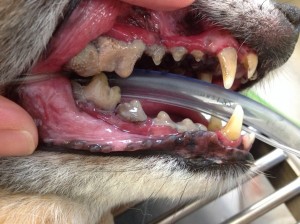
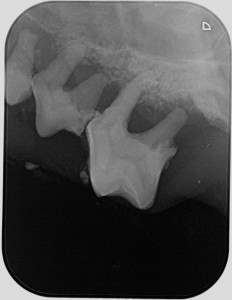
Treatment involves full mouth dental x-rays to guide extractions and local anaesthetic nerve blocks are performed prior to extractions to prevent any pain during recovery from general anaesthetic. All loose or rotten teeth as well as those with irreversibly exposed roots are removed and gums are closed with dissolvable stitches. It is not uncommon for us to remove 8 to 10 teeth in these cases! Remaining teeth are of course cleaned and polished and your pet will go home with antibiotics and pain relief.
REMEMBER: gingivitis and bone infection are PAINFUL not to mention SMELLY. In addition, bacteria from the mouth can also enter the blood stream where they can damage the heart, liver and kidneys.
So please book in for a FREE dental check today.
During July we are offering 20% off
our regular desexing prices.
There are many benefits to be gained by desexing your pet but what can you expect on the day of the procedure and after surgery?
The night before surgery your pet can have dinner as usual. However, food must not be left out overnight for cats and dogs and they will need to skip breakfast. We will offer them afternoon tea once they have recovered! It is okay to leave water out overnight for your pet and important that rabbits and guinea pigs are not fasted at all.
After your pet is admitted to our clinic in the morning, they will be checked over and made comfortable in our separate dog and cat wards. After their desexing procedure they will be recovered under continuous supervision by the nursing team. Once they are alert enough to be offered a snack we will call you to organise a time for discharge later in the afternoon.
It is highly recommended that most pets wear an Elizabethan collar (cone) for eight days after their surgery. We use dissolvable stitches that cannot be chewed at and do not need to be removed, but it is still important that your pet doesn’t lick their surgery site. This is to prevent infection and the wound opening up. Pets quickly get used to these cones and are able to eat, drink and sleep normally with them on. Rabbits and guinea pigs do not need to wear cones.
Your pet may be a little sleepy the night after their surgery but should be bright and eating normally the next day. It is important to rest your pet for the week after surgery to allow the wound to heal quickly. We will dispense pain relief medication for you to give to your pet once a day during this time.
We typically wish to see your pet two days after surgery to check all is going well and then again at eight days post surgery to give them the all clear, get that cone off and get them back to normal activities.
Call the clinic on 5278 5400 to book your pet in for desexing during July.
We are offering FREE dental checks and 10% OFF all dental procedures throughout August.
DOES YOUR DOG HAVE DOG BREATH?
DOES YOUR CAT HAVE DOG BREATH??
Bad breath or halitosis is the smell of bacterial scum/plaque on your pet’s teeth. It is NEVER NORMAL and ALWAYS INDICATES A PROBLEM.
By 3 years of age, 80% of dogs and 70% of cats will be suffering from some degree of bacterial mouth infection. Bacterial plaque hardens to form tartar and spreads under the gum line where toxins from the bacteria cause gingivitis, bone infection and ultimately tooth loss.
Gingivitis and bone infection are PAINFUL. Your pet will invariably continue to eat because the alternative is starvation. Sometimes you can see them chewing on one side of their mouth only.
Bone infection weakens the bone and can lead to fractures of the jaw from simple activities like ball catching. Bacteria from the mouth can also enter the blood stream where they can damage the heart, liver and kidneys.
The GOOD NEWS is that these days we have the expertise and technology to look after our pet’s teeth and mouths as we would our own.
So if your pet’s breath is knocking you out please see us for a FREE dental check, discussion of any required treatment and tips on how to prevent tartar occurring.
Book in for a FREE dental check today.
We are offering a MASSIVE 20% OFF the regular price of desexing during July.
Here are 10 reasons why YOU should desex YOUR pet:
1) Male cats that have not been desexed mark their territory – your house – by spraying urine on walls and furnishings.
2) They roam greater than 5km in search of female cats, crossing busy roads and often getting hit by cars. In an attempt to defend their “territory”, male cats will aggressively attack other cats and even dogs, often ending up with wounds and abscesses themselves.
3) Bites from other cats spread the feline AIDs virus. 25% of stray cats in this area carry this virus.
4) Female cats that have not been desexed come into heat several times a year. They become more vocal, demandingly affectionate and attempt to wander off whereby they are extremely good at getting pregnant.
5) Female dogs that have not been desexed usually come into heat twice a year. This is accompanied by approximately 1 week of vaginal bleeding and they need to be separated from male dogs for 3 weeks.
6) Mammary tumors are very common in female dogs and cats that have not been desexed. In dogs, 50% of these are malignant (spread to other parts of body). In cats an alarming 80% are malignant. Mammary tumors are hormonally influenced and spaying your pet young almost eliminates their occurrence.
7) Testicular cancers occur commonly in male dogs. Ovarian cancer occurs less frequently in female dogs and cats but 50% are malignant. Vaginal and vulvar tumors are also hormonally influenced.
8) Male dogs that have not been desexed always develop enlarged prostate glands with age. This can lead to trouble urinating, constipation and perineal hernias – ruptures of the muscle around the anus.
9) Older female dogs that have not been desexed commonly get a condition known as pyometra or “pus filled uterus”. This is life-threatening condition and requires emergency surgery.
10) Male dogs that have not been desexed are more likely to display aggression towards other dogs and more likely to challenge the “pecking order” in your home.
BONUS REASON: Council registration fees are higher for non-desexed dogs and cats.
All this can be prevented or greatly minimised by desexing your pet – BOOK THEM IN TODAY
August is Dental Month and we would like to check your pet’s teeth for FREE.
10 reasons to get your pet’s teeth checked:
1) Periodontal disease begins when bacteria in the mouth produce a scum called plaque, which sticks to the surface of the teeth. Minerals in saliva then harden the plaque into calculus (tartar). As this plaque and calculus spread under the gum line, bacterial toxins are released which cause gingivitis and damage the supportive structures around the teeth resulting in bone infection and tooth loss.
2) Periodontal disease is the most common disease in adult dogs and cats. By 3 years of age 80% of dogs and 70% of cats are suffering from some degree of periodontal disease.
3) Bad breath is not normal. If your dog or cat has bad breath you are smelling periodontal infection. Often this is the only sign that periodontal disease is present. As a result, dental treatment often comes too late to prevent extensive disease.
4) Gingivitis and bone infection are PAINFUL. Most animals will continue to eat because the alternative is starvation.
5) In dogs we commonly see broken teeth, specifically “slab fractures” of the upper carnassials – the big molars up the back of the mouth. When these teeth fracture the whole side of the tooth snaps off causing PAIN and infection. Often these fractures progress to tooth root abscesses.
6) Cats also commonly suffer from tooth resorption. Over 50% of adult cats are affected. The exact cause has not been determined but the destructive process results in holes in the teeth. Tooth resorption is VERY PAINFUL and these teeth need to be removed.
7) Effects of periodontal disease can include development of a hole or fistula between the mouth and the nasal passages which causes infection and nasal discharge.
8) Bone infection or osteomyelitis destroys bone and weakens the jaw, which can lead to jaw fractures. Fractures can result from simple activities like catching a ball.
9) Bacteria from the mouth can enter the blood stream and cause serious damage in the heart, liver and kidneys.
10) Periodontal disease also makes diabetes mellitus more difficult to control and increases diabetic complications. Good dental hygiene is an important part of the management of diabetes.
Your pet deserves a pain free mouth.
Book in for a FREE dental check today.
GET A MASSIVE 20% OFF DESEXING PRICES DURING THE MONTH OF JULY
Why have a month to specifically highlight the need to desex your pet? Mainly because unwanted pets remain a problem with RSPCA reporting an average 160,000 animals being taken in by shelters annually. Many do not find safe homes or owners. Usually these strays are the result of unplanned breeding by companion pets that should have been desexed.
Desexing is a straightforward procedure that only requires a day stay at the clinic, with pets fully recovered within a few days.
Aside from preventing accidental litters, there are many health and behavioural benefits to desexing*:
- Desexed animals are generally less likely to get diseases and certain illnesses such as mammary cancer and uterine infections in females and prostate problems in males.
- Desexing commonly reduces behaviour problems such as roaming, aggression and urine marking in males.
- In females it prevents mating behaviour and false pregnancy. Reducing the desire to roam also reduces the risk of being in a traumatic accident such as being hit by a car.
*courtesy RSPCA
Read more about why you should consider desexing your pet here or
download our information sheet here.
TO GET 20% OFF DESEXING PRICES DURING JULY, CONTACT US TODAY.
A dog or cat over the age of 7-8 years is generally considered a senior pet and can start to slow down. Often, senior pets begin to develop diseases common to their senior human counterparts, such as diabetes, heart disease, endocrine disease, cancer and arthritis. Many of these conditions can go unnoticed in their early stages; therefore preventative health care is very important. If left undetected, many diseases can put our pet’s health at risk. The best approach to caring for your senior pet includes preventative diagnostics such as twice yearly check ups and an annual blood test.
Because you know your pet better than anyone, we would like you to look at the check list below to see if you have noticed any of the following signs in your pet:
- Change in appetite
- Discomfort on rising or after exercise
- Weight loss or weight gain
- Loss of housetraining
- Excessive drinking and/or urination
- Bad breath, plaque /tartar or bleeding gums
- Confusion or disorientation
- Persistent cough
- Appearance of lumps and bumps
- Loss of sight or hearing
We would love to try and see all of our senior pets in the month of April for a check up! What we will offer during this visit will be:
- A thorough physical examination
- A senior blood panel to check liver and kidney function plus thyroid function in cats
- Weight check
- Arthritis grading
- Dental Assessment
- Heart monitoring
- Eye examination
- Examination of lumps and bumps
Just for the month of April we are offering this visit at a discounted price of $140!
Call the clinic now to book your pet in. Call (03) 5278 5400.
